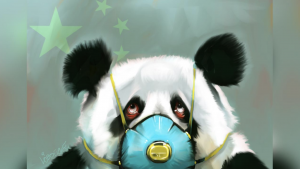Home » Commentary » Opinion » Communists lose the ability to care for themselves
· The Australian


Severe acute respiratory syndrome 2003. Pneumonic plague 2009. Coronavirus 2020. Avian flu just about every other year. Why does it seem like the next virus apocalypse is always coming from China?
Compared with other developing countries, China has a highly effective public health service. It has world-class epidemiological laboratories. Its ruling Communist Party, though deeply authoritarian, is widely admired for its supposedly meritocratic management ethic. And the Chinese state is probably unique in the world in its ability to completely lock down and isolate a city of 10 million people like Wuhan.
All that should make China a public health paradise, even if – for many people – a human rights hell. Australian public health authorities can only dream of having the tools and resources at their disposal that China’s can command at a moment’s notice. Yet countries such as Australia don’t seem to have China’s predilection for pandemics.
Most of China’s deadly new viruses arise from close contact between humans and animals. This year’s deadly coronavirus epidemic is thought to have begun in a seafood market, which also hosted illegal vendors selling live wild animals for game meat.
The 2003 SARS epidemic is thought to have originated in bats. It was spread through a Hong Kong apartment block by bad plumbing, which allowed infected fumes from human waste to vent out into neighbours’ units.
Avian flu strains regularly spread from close contact with chickens and ducks. The 2009 plague outbreak (caused by a bacterium, not a virus) originated in a wild marmot.
China is a country of 1.4 billion people, about half of whom still live in rural areas. Rapid urbanisation means that many city-dwellers are themselves recent immigrants from the countryside. Direct contact between people and food animals is still common, even in cities. Old habits die hard, and for many new urbanites the only fresh chicken is a live chicken.
But you can buy game meat in Australia and be confident that it’s safe to eat. Australian hunters routinely trek the bush without bringing home strange diseases. Australian farmers raise chickens — even free-range chickens — without catching avian flu. And tourists fly thousands of kilometres to encounter Australia’s wildlife without fearing for their lives. For Australian bushwalkers, spiders are a bigger threat than viruses. If we had to rely on Australia’s state and federal governments to keep us safe from all these potential threats, God help us. They couldn’t tell a sick marmot from a spoiled marmalade.
Luckily, we have a more reliable guardian to look after our public health: ourselves.
Australians self-organise to learn bush safety from hundreds of local bushwalking clubs. Need to know how to dress game meat without catching any nasty bugs? Attend one of the many classes offered by the Game Hunters Association or just watch the Sporting Shooters’ Association’s detailed video guides. Are you a farmer who wants to go free-range organic but are unsure about the sanitary procedures? Join the Free Range Farmers Association. They’re ready to help.
Of course, there are government regulations that apply in all of these areas. But unless you have an in-house legal team to keep you informed and up to date, you probably won’t even be able to find all the relevant regulations, never mind obey them. In Australia, civil society performs the vital function of translating principles into guidelines, rules into behaviour.
More than that, civil society self-regulates. It goes beyond the bare minimum limits set by government to establish social norms and codes of practice. And we generally follow those norms and practices without any need for direct government oversight. We oversee ourselves.
Civil society is the key gap in China’s public health infrastructure. China has the laws — lots of them. And it has the heavy-handed penalties with which to enforce them. But the state can’t be everywhere, not even in China. When it is absent, it’s “anything goes”.
Communism destroyed civil society everywhere it attained absolute power: in eastern Europe, in Cuba, in Vietnam and in China. But China’s problems run even deeper. The two great governing traditions of ancient China, legalism and Confucianism, focused on the primacy of the state. They prescribe the relationships between rulers and ruled. They lack any concept of people self-organising to rule themselves.
China’s bureaucratic authoritarian state has made great strides in building infrastructure, fostering advanced technologies and even reducing poverty. It certainly knows how to repress its people and bully its neighbours. It can force hundreds of thousands of recalcitrant minorities to labour in concentration camps. But it can’t make everyone behave sensibly, all of the time.
Australian civil society accomplishes what 100 million bureaucrats cannot: it ensures good public health by promoting safe practice broadly, across every niche of the economy, nearly all of the time. There are lapses and even (occasionally) frauds. But few people fall between the cracks and when they do there’s always someone ready to help them back up again.
If you want to know why Australia is healthier than China, don’t credit capitalism and certainly don’t credit government. Credit society.
Communists lose the ability to care for themselves